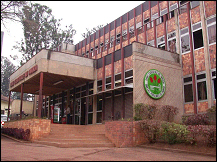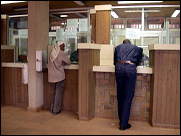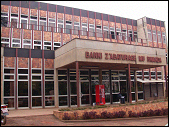 HISTORICAL
BACKGROUND HISTORICAL
BACKGROUND |
The 'Banques Populaires' of Rwanda which can
be considered as savings and loans' cooperatives
started carrying out activities promoting savings
and loans in 1975. The activities started as a
government project with the financial and technical
support of the Swiss Federal Government, a project
that enjoyed Government exoneration from duties
and taxes. From the time they were created, the
Banque Nationale du Rwanda (Central Bank) authorised
these savings and loans cooperatives to bear the
name "Bank". This project that was entitled
'Bureau d'Orientation des Banques Populaires du
Rwanda acted as a coordination centre for the
creation of 'Banques Populaires' in various parts
of the country. It later provided monitoring and
support for the 'Banques Populaires'.

The desired objective is to develop mass savings
and loans, to promote the economic and social
well being of shareholders, their families and
the community at large through mutual aid and
solidarity. These banks seek to attain this objective
in the following ways:
· By giving members the opportunity to
invest their savings with interest;
· By granting loans to members so as to
enable them to fulfil their economic requirements;
the loans being reimbursable according to pre-determined
terms that can be adapted to each different case;
· By enabling people who lack financial
means but are nevertheless honest and hardworking
to have access to small loans with which to fund
small income generating projects;
· By encouraging the spirit of local initiative
as well as agricultural and non-agricultural activities,
through careful utilisation of the savings generated,
within the mandate of the 'Banque Populaire';
· By teaching people to respect commitments,
the practice of saving, and foresight;
· By discouraging usurious rates of interest,
and speculation;
· By creating mutual confidence among members;
· By building up an indivisible and inalienable
cooperative fortune.

In 1986, the 80 'Banques Populaires' already created
grouped themselves into a national federation
known as the Union of 'Banques Populaires' of
Rwanda (UBPR) that took over the role and functions
of the Bureau d'Orientation des Banques Populaires
du Rwanda. However, two aspects remained the same:
Firstly, the Swiss continued to fund the activities
of the UBPR in the same manner in which they had
funded those of the 'Bureau d'Orientation'. Secondly,
expatriates managed the UBPR until 1992 as was
the case for the 'Bureau d'Orientation'.
The number of 'Banques Populaires' increased so
steadily that by the time of the War and Genocide
of 1994, there were 131 'Banques Populaires' located
throughout the country, comprising 380,000 members.
After the end of the 1994 War, the Rwandan-Swiss
Accords by virtue of which the Swiss provided
grants to the 'Banques Populaires' and through
which the Rwandan Government exonerated the 'Banques
Populaires' from paying duties and taxes were
not renewed.
Some statistics of the 'Banques Populaires'
as at 31st December 2001 and as at 30th June 2002
Table
 ORGANISATION
STRUCTURE ORGANISATION
STRUCTURE |
The 'Banques Populaires' are savings and loans cooperatives.
They carry out their activities in keeping with
universal cooperative principles, and are subject
to the Cooperative Law of Rwanda of 1988. In their
capacity as financial institutions, the 'Banques
Populaires' are also subject to the law of 1999
governing the regulation of banks and other financial
establishments.

Each 'Banque Populaire' is an autonomous cooperative
governed by a Board of Directors and controlled
by a Monitoring Council elected by and from among
members of the Bank, who are themselves the sole
owners. The Board of Directors recruits a Manager
who oversees the daily operations of the Bank, in
particular the reception of deposits, as well as
withdrawals. However, the Board of Directors retains
the important responsibility of authorising expenditure
and approving loans.
All the 'Banques Populaires' are members of a Union
which is also a cooperative whose members are the
'Banques Populaires'.
The Union is managed by a Board of Directors and
controlled by a Monitoring Council elected by, and
from within the General Assembly of Delegates from
the 'Banques Populaires', in which each bank is
represented by one member. The Union has the task
of ensuring the proper functioning of 'Banques Populaires'
and plays three major roles: the management of liquid
assets, technical support and the monitoring'of
'Banques Populaires'. In keeping with the statutes
of the Union and those of the 'Banque Populaires',
the latter receive instructions from the Union.
The Union's Board of Directors appoints a Managing
Director who is henceforth responsible for the daily
management of the Union.
|
 THE
MAIN PROBLEMS THE
MAIN PROBLEMS |
The 1994 War and Genocide resulted in the theft
of liquid assets of the 'Banque Populaires' amounting
to 700 million Rwandan Francs, and also resulted
in irrecoverable loans amounting to 1.5 billion
Rwandan Francs, either because the debtors have
since died or because they no longer have the means
to repay their debts and the guaranties have since
been destroyed.
 CURRENT
ACTIVITIES CURRENT
ACTIVITIES |
a) External auditing
In mid-2000, the Central Bank sent two auditing
companies to the UBPR. One was to carry out the
financial auditing and the other was to perform
the strategic and organisational auditing. The final
reports played a large role in the elaboration of
the 2001 - 2004 action plan that the UBPR drew up
under the supervision of the Central Bank.
b) The technical assistance program of the World
Council of Credit Unions, WOCCU (Conseil Mondial
des Coopératives d'Epargne et de Crédit)
With the financial assistance of USAID, the World
Council of Credit Unions (WOCCU) is implementing
a program to render technical assistance to the
'Banques Populaires' for a period of four years.
This program started in October 2000. It aims at
improving financial operations within the 'Banques
Populaires', as well as spreading the banks' activities
so that the greater majority of the Rwandan population
may have access to them.
c) Financial assistance from the World Bank
The 'Banques Populaires' benefited from a recapitalisation
grant from the Rwandan Government amounting to US$
5,000,000. These funds are included among funds
granted by the World Bank to the Rwandan Government
in order to help the 'Banque Populaires' to reconstitute
its capital. This capital was lost during the theft
of liquid assets from the 'Banques Populaires' during
the 1994 War and Genocide, amounting to Frw 700,000,000
as well as irrecoverable loans amounting to Frw
1.5 billion before the 1994 War and Genocide caused
by the death of debtors, or inability of debtors
to pay and destroying of guarantees.
 ACTIVITIES
OF THE 'BANQUES POPULAIRES' OF RWANDA ACTIVITIES
OF THE 'BANQUES POPULAIRES' OF RWANDA |
· Management of sight deposits and short-term
investments by members using special account/savings
books;
· Management of current accounts;
· Management of home-loan accounts, loans
for solar energy equipment, retirement-fund and
other accounts;
· The granting of various types of loans:
housing loans, working advances to senior staff,
loans for agricultural, crafts, livestock rearing
and commercial activities, etc.;
· Management of external credit lines granted
by the World Bank, the African Development Bank,
International Fund for Agricultural Development
(IFAD) and other international Donors to facilitate
the granting of small loans in the framework of
poverty alleviation programs;
· Payment of salaries to civil servants and
employees of private companies in return for a special
fee;
· The awarding of pensions as well as social
security payments from the Caisse Social du Rwanda
(Social Security Fund) in return for payment of
a fee;
· Countrywide money transfers on behalf of
public and private companies in return for payment
of a transfer fee;
· Other banking activities.
 PROJECTS
BEING UNDERTAKEN PROJECTS
BEING UNDERTAKEN |
The 'Banques Populaires' of Rwanda received funding
from USAID to carry out computerisation of the Union
and the 20 largest 'Banques Populaires'. This was
in answer to the malfunctioning of the integrated
banking software GLOBUS which had been installed
in 1993.
The Union of 'Banques Populaires' received permission
from VISA INTERNATIONAL to issue credit cards in
the near future in collaboration with other commercial
banks in Rwanda through the Société
Interbancaire de Monétique et de Télé
(interbank society for electronic money funds),
in which the UBPR is a shareholder.

The 'Banques Populaires' of Rwanda are interested
in furthering their collaboration with WESTERN UNION.
The former have a large network based on an ever-increasing
membership and a soaring rate of deposits, which
makes the 'Banques Populaires' the only financial
institution that is capable of serving a wide majority
of the Rwandan population. Attached to this document
is a list of the 'Banques Populaires', the number
of members, the amount of deposits, loans granted
and location of loans throughout the country, and
telephone contacts of those who have already received
loans (as at 30th June 2002). For those banks that
do not have telephones, the Union of 'Banques Populaires'
has in each province of the country a Regional Accountant
equipped with a telephone and fax for receiving
information, as well as a Regional Delegate who
circulates using a motor-cycle in order to distribute
postal orders to the 'Banques Populaires' and any
other information sent by the Union. In addition,
the UBPR has a collaboration contract with the National
Post Office to utilise the EMS speedpost. The National
Post Office has just established a postal service
at each 'Banque Populaire'.
Table |

